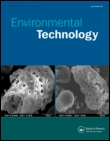
ENVIRONMENTAL TECHNOLOGY
Scope & Guideline
Pioneering Research for a Sustainable Future
Introduction
Aims and Scopes
- Wastewater Treatment Technologies:
Research on advanced treatment processes for municipal and industrial wastewater, including biological, chemical, and physical methods to enhance pollutant removal efficiency. - Pollution Remediation and Control:
Studies focused on the degradation and removal of pollutants from various environments, utilizing innovative methods such as photocatalysis, electrochemical processes, and bioremediation. - Resource Recovery and Recycling:
Exploration of technologies for recovering valuable resources from waste materials, including metals, nutrients, and energy, to promote circular economy practices. - Environmental Impact Assessment:
Research assessing the environmental impacts of various technologies and practices, including life cycle assessments and risk evaluations related to pollutants and waste management. - Sustainable Materials and Processes:
Development and application of new materials and processes that are environmentally friendly, such as biodegradable materials, green chemistry, and bioproducts.
Trending and Emerging
- Advanced Oxidation Processes (AOPs):
There is an increasing focus on advanced oxidation processes for the degradation of persistent organic pollutants, reflecting advancements in photocatalysis and electrochemical methods. - Microbial Fuel Cells and Bioelectricity:
Research on microbial fuel cells and their applications for wastewater treatment and energy recovery is gaining momentum, as scientists explore sustainable energy production from organic waste. - Nanotechnology in Environmental Remediation:
The application of nanotechnology for pollutant removal and environmental remediation is emerging as a significant trend, with studies investigating the use of nanomaterials for enhanced adsorption and degradation. - Integrated Waste Management Systems:
There is a growing emphasis on integrated approaches to waste management that combine multiple treatment technologies, reflecting a trend towards holistic solutions for waste and resource recovery. - Climate Change Mitigation Strategies:
Research focusing on technologies and practices aimed at mitigating climate change impacts, such as carbon capture and storage, is increasingly prominent in current publications.
Declining or Waning
- Traditional Chemical Treatment Methods:
There has been a noticeable decrease in the publication of papers focusing solely on conventional chemical treatment methods, as researchers increasingly explore more innovative and sustainable alternatives. - Basic Environmental Monitoring:
Research focused on basic environmental monitoring techniques has waned, with a shift towards more integrated and advanced monitoring systems that leverage technology and data analytics. - Single Pollutant Studies:
Studies examining the effects of single pollutants in isolation are less common, as there is a growing emphasis on understanding the interactions and cumulative effects of multiple pollutants. - End-of-Pipe Solutions:
There is a declining interest in traditional end-of-pipe solutions for pollution control, as the focus shifts towards preventive measures and sustainable practices that minimize waste generation. - Laboratory-Scale Studies:
Research presenting results solely from laboratory-scale studies is declining, as there is a stronger emphasis on pilot-scale and field studies that demonstrate practical applications.
Similar Journals

Environmental Engineering and Management Journal
Advancing sustainable solutions for a cleaner future.Welcome to the Environmental Engineering and Management Journal, a pivotal platform for disseminating knowledge and innovative research in the fields of Environmental Engineering, Management, Monitoring, Policy, and Law. Published by GH Asachi Technical University of Iasi in Romania, this journal has been committed to fostering discussions and advancements in environmental solutions since its inception in 1988, with continuous publication from 2002 to 2024. While classified in the Q4 category across various environmental disciplines in 2023, it remains an important resource for scholars and practitioners navigating the complexities of pollution and environmental management. With an ISSN of 1582-9596 and an E-ISSN of 1843-3707, this journal encourages submissions that address pressing ecological challenges and provide actionable insights. Although currently not open access, it seeks to expand its reach and relevance within the global academic community. Join us as we explore critical environmental issues and contribute to sustainable practices worldwide.
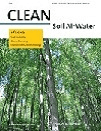
CLEAN-Soil Air Water
Empowering Global Knowledge in Environmental ScienceCLEAN-Soil Air Water, an esteemed journal published by Wiley, serves as a vital platform for disseminating research in the fields of environmental chemistry, pollution, and water science and technology. Operating under an Open Access model, it embraces the principles of knowledge sharing, making significant research findings readily accessible to a global audience. With an ISSN of 1863-0650 and an E-ISSN of 1863-0669, the journal has demonstrated its importance in the academic community, reflected in its Scopus rankings within the top quartiles of its categories. Established in 2007 and continuing through to 2024, CLEAN-Soil Air Water offers researchers, professionals, and students an opportunity to explore innovative studies that address pressing environmental challenges, facilitating an exchange of novel ideas and techniques essential for sustainable development. With a publication footprint in Germany and a growing international reputation, this journal is an invaluable resource for those dedicated to advancing the science and practices of environmental stewardship.
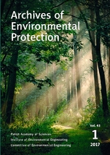
Archives of Environmental Protection
Connecting Scholars to Drive Ecological ProgressArchives of Environmental Protection, published by the Polish Academy of Sciences, is a pivotal journal in the field of Environmental Science. With an ISSN of 2083-4772 and E-ISSN of 2083-4810, this journal serves as a critical platform for disseminating innovative research and comprehensive reviews that address the complexities surrounding environmental issues. As of 2023, it holds a respectable Q3 ranking in Environmental Science, reflecting its relevance and contribution to the academic community, indicated by a Scopus rank of 124 out of 233 in the General Environmental Science category. Although it operates without Open Access, the journal's consistent publication from 2007 to 2024 emphasizes its commitment to advancing knowledge in diverse areas of environmental protection. Researchers, professionals, and students are encouraged to engage deeply with the wealth of insights offered through the rigorous peer-reviewed articles presented in this journal, which strive to foster sustainable practices and environmental stewardship.

ENVIRONMENTAL ENGINEERING SCIENCE
Exploring innovations in environmental science and engineering.ENVIRONMENTAL ENGINEERING SCIENCE is a leading journal published by MARY ANN LIEBERT, INC that provides a platform for pioneering research in the fields of environmental chemistry, pollution control, and waste management. With an ISSN of 1092-8758 and an E-ISSN of 1557-9018, this peer-reviewed journal aims to disseminate high-quality scientific studies that address critical environmental challenges. As evidenced by its 2023 category quartile rankings, it holds a notable position at Q3 in Environmental Chemistry and Pollution and Q2 in Waste Management and Disposal, highlighting its relevance and impact in these domains. Spanning over two decades from 1997 to 2024, the journal is dedicated to fostering innovations and promoting rigorous scholarship that can contribute significantly to sustainable environmental practices globally. Authors and researchers are encouraged to engage with this essential resource, which offers Open Access options to enhance the visibility and reach of their work. For those interested in advancing their understanding and practice within the environmental sciences, ENVIRONMENTAL ENGINEERING SCIENCE is an indispensable journal to consider.
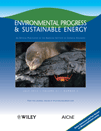
Environmental Progress & Sustainable Energy
Advancing sustainability through innovative research.Environmental Progress & Sustainable Energy, published by WILEY, is an influential journal dedicated to the crucial fields of environmental science and sustainable energy. Since its inception in 2009, this journal has consistently aimed to advance knowledge and understanding of innovative approaches and technologies that promote sustainability across various sectors. With an impact factor reflective of its strong academic contributions, the journal is catapulted into Q2 and Q3 quartiles across multiple categories, including Chemical Engineering and Environmental Science, demonstrating its central role in the dialogue surrounding pressing environmental issues. Researchers and professionals can access its cutting-edge studies through both traditional and open access options, facilitating the dissemination of knowledge globally. Addressed to an array of stakeholders from academia and industry alike, Environmental Progress & Sustainable Energy is not only a repository of research but also a platform for transformative ideas that aim to pave the way for a more sustainable future, making it an essential resource for those committed to the interplay of environmental stewardship and energy innovation.

Environmental Science-Advances
Empowering research to tackle global challenges.Environmental Science-Advances, published by the esteemed Royal Society of Chemistry, is a pioneering open-access journal dedicated to advancing the field of environmental sciences. Having commenced publication in 2022, this journal serves as a vital platform for the rapid dissemination of high-quality research covering a broad scope, including environmental chemistry, pollution management, water science and technology, and environmental engineering. With its commitment to open access, it ensures that vital environmental research is freely available to researchers, professionals, and students worldwide, thus fostering collaboration and innovation in addressing pressing environmental challenges. Currently, the journal is ranked in the Q2 and Q3 quartiles across various categories such as Environmental Engineering and Water Science, indicating its growing influence within the academic community. With the global imperative for sustainable environmental solutions, Environmental Science-Advances is positioned to become an invaluable resource for those dedicated to the study and solution of environmental issues.

Water Conservation Science and Engineering
Fostering Collaboration for a Sustainable Water FutureWater Conservation Science and Engineering, published by SPRINGERNATURE, is a vital academic journal dedicated to advancing the fields of environmental engineering, ocean engineering, waste management, and water science and technology. Since its inception in 2016, the journal has quickly established itself within the academic community, achieving a commendable Q3 ranking across multiple categories in 2023. With an ISSN of 2366-3340 and an E-ISSN of 2364-5687, it is accessible to a global readership eager to explore the latest research and innovations in water conservation and sustainable practices. Although currently not open access, the journal is committed to publishing high-quality scholarly articles that provide insights into effective water management strategies, innovative engineering solutions, and the critical importance of preserving our water resources. Based in Singapore, Water Conservation Science and Engineering aims to foster interdisciplinary collaboration among researchers, professionals, and students, making it an essential resource for anyone passionate about environmental sustainability and preservation.

Advances in Environmental Research-An International Journal
Driving Change through Scholarly DiscourseAdvances in Environmental Research is an international journal published by TECHNO-PRESS, dedicated to advancing our understanding of environmental science and sustainability. Operating with an ISSN of 2234-1722 and an E-ISSN of 2234-1730, this journal serves as a premier outlet for researchers, professionals, and students aiming to share pioneering research findings, case studies, and reviews that address contemporary environmental challenges. The journal aims to provide a platform for scholarly discussion on a wide range of topics, including pollution control, resource management, and ecological conservation. Though currently classified as a non-open access journal, it remains accessible through various institutional subscriptions, allowing a broad audience to engage with its content. Committed to fostering academic collaboration and innovation, Advances in Environmental Research plays a crucial role in informing policymakers and the scientific community about emerging trends and solutions in environmental studies, making it an essential resource for those dedicated to creating a sustainable future.
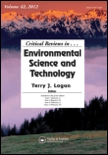
CRITICAL REVIEWS IN ENVIRONMENTAL SCIENCE AND TECHNOLOGY
Unveiling Insights for Environmental ProgressWelcome to CRITICAL REVIEWS IN ENVIRONMENTAL SCIENCE AND TECHNOLOGY, an esteemed journal published by Taylor & Francis Inc. This journal has been at the forefront of environmental research since its inception in 1993, spanning a wide range of disciplines including environmental engineering, pollution control, waste management, and water science. CRITICAL REVIEWS holds an impressive Q1 ranking in multiple categories, including Environmental Engineering and Pollution, demonstrating its critical role in advancing knowledge within the field. With a remarkable Scopus ranking—placing it in the top 1% for Environmental Science categories—this journal serves as an invaluable resource for researchers, professionals, and students alike, providing comprehensive reviews and analyses that catalyze innovative solutions to pressing environmental challenges. Though currently not open access, the journal's content is accessible through various academic platforms, ensuring that cutting-edge research is available to a global audience. Join the community of scholars dedicated to enhancing our understanding of environmental science and technology through rigorous investigation and critical discourse.
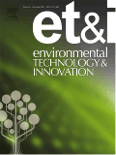
Environmental Technology & Innovation
Pioneering Research at the Intersection of Nature and TechnologyEnvironmental Technology & Innovation is a leading academic journal published by Elsevier, focusing on groundbreaking research and advancements in the fields of Environmental Science, Plant Science, and Soil Science. Since its inception in 2014, this prestigious journal has established itself in the top Q1 quartiles of its categories, reflecting its commitment to publishing high-quality, impactful research. As evidenced by its impressive Scopus ranks, including a rank of #14/516 for Plant Science and #5/159 for Soil Science, it serves as a vital resource for scholars, researchers, and professionals aiming to advance their understanding and innovation in environmental technologies. Although it operates under a subscription model, the journal provides significant insights and access options, making it an essential addition to any researcher's library. With its emphasis on sustainability and technological advancements, Environmental Technology & Innovation remains at the forefront of addressing global environmental challenges and fostering innovative solutions.